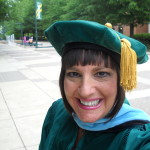By Dr. Laura Hills, President, Blue Pencil Institute, www.bluepencilinstitute.com
Today marks two years for me on Twitter – my Twitter-versary, if you will. As I contemplate the relationships I’ve formed, the good ideas I’ve gleaned, and the huge amount of personal and professional development material I’ve written for my Twitter followers, I find myself sincerely grateful to the Twitterverse.
two years for me on Twitter – my Twitter-versary, if you will. As I contemplate the relationships I’ve formed, the good ideas I’ve gleaned, and the huge amount of personal and professional development material I’ve written for my Twitter followers, I find myself sincerely grateful to the Twitterverse.
I have 5,000 followers. That’s astounding. And these are real, living, breathing people from all over the world. I see my messages favorited and retweeted all the time. People interact with me daily. And since I began my Twitter career, I’ve received loads of positive feedback from followers who tell me that I am making a difference. For instance, take a look at what just a few have had to say:
“Your message is always powerful and convincing. Thank you so much!! I wish I could have audio Twitter to listen to your voice. Your wealth of information and ideas are inspiring too! Our company needs someone like you to empower women.” – Mana, Japan
“Love your tweets. Thanks for the inspiration. They always seem to come at the right time for me, too.” – Michelle, Ohio
“Powerful tips, I must tell you. You’re nurturing the seed of leadership in me. When you write, I’m fed.” – Samuel, Nigeria
“You have helped me a great deal without even knowing it. I am a new supervisor and your words are like little daily gems.” – Flo, New York City
“You have no idea how much your tweets have helped me.” — Roger, Mexico
This is just the tip of the iceberg. In all, more than 100 of my followers have reached out to me in this way – unsolicited – just to tell me how much they appreciate what I’m doing. I’ve treasured each of these comments, so much so that I’ve created a Pinterest board to showcase them: http://pinterest.com/drlaurahills/high-praise-for-my-tweets/
When I began tweeting two years ago, I had selfish reasons. I wanted to promote Blue Pencil Institute. But Twitter has turned into something much more than that for me. Little did I know then that I would find a virtual, global classroom in which I could teach and make a difference in the world every day.




